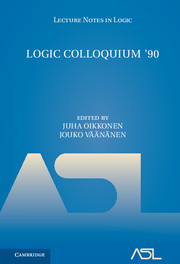Book contents
- Frontmatter
- Foreword
- Miscellaneous Frontmatter
- Contents
- A note on the ordinal analysis of KPM
- On the geometry of U-rank 2 types
- Definability and global degree theory
- About the irreflexivity hypothesis for free left distributive magmas
- On complete filters
- Labelled deductive systems: a position paper
- Temporal expressive completeness in the presence of gaps
- New foundations for mathematical theories
- Absoluteness for projective sets
- A division algorithm for the free left distributive algebra
- Gentzen-type systems and resolution rule. Part II. Predicate logic
- An intuitionistic theory of lawlike, choice and lawless sequences
- Sense and denotation as algorithm and value
- A transfinite version of Puiseux's theorem, with applications to real closed fields
- On similarities of complete theories
- Decidability questions for theories of modules
- On CH + 2N1 → for
- On the structure of gamma degrees
- References
Definability and global degree theory
Published online by Cambridge University Press: 24 March 2017
- Frontmatter
- Foreword
- Miscellaneous Frontmatter
- Contents
- A note on the ordinal analysis of KPM
- On the geometry of U-rank 2 types
- Definability and global degree theory
- About the irreflexivity hypothesis for free left distributive magmas
- On complete filters
- Labelled deductive systems: a position paper
- Temporal expressive completeness in the presence of gaps
- New foundations for mathematical theories
- Absoluteness for projective sets
- A division algorithm for the free left distributive algebra
- Gentzen-type systems and resolution rule. Part II. Predicate logic
- An intuitionistic theory of lawlike, choice and lawless sequences
- Sense and denotation as algorithm and value
- A transfinite version of Puiseux's theorem, with applications to real closed fields
- On similarities of complete theories
- Decidability questions for theories of modules
- On CH + 2N1 → for
- On the structure of gamma degrees
- References
- Type
- Chapter
- Information
- Logic Colloquium '90 , pp. 25 - 45Publisher: Cambridge University PressPrint publication year: 2017
References
- 2
- Cited by



